CIA Sponsored Terror, Civil Liberties, Criminalizing Dissent, FBI Intrusion, Habeas Corpus, Human Rights, Supreme Court, Surveillance, Truth to Power, War Resister
Podcast: Play in new window | Download
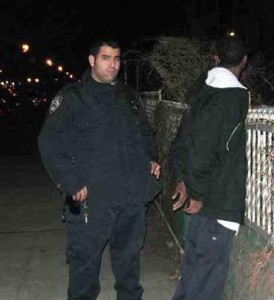
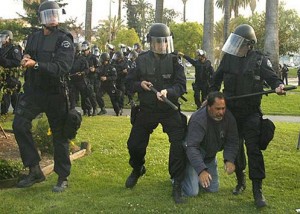
NYPD Chief Bill Bratton – Broken Windows – Stop and Frisk
New York City Mayor-elect Bill de Blasio announced Mr. Bratton’s appointment as the new commissioner of the New York Police Department this month. He lauded Mr. Bratton’s work in Los Angeles, saying he could police fairly while still bringing down crime. After a 7 years leading the Los Angeles Police Department there’s been an increase in police presence among the homeless in and around Skid Row, plus excessive stops of pedestrians especially in poorer communities.
Attorney Carol Sobel:
- Broken Windows is a program that Bratton began in New York with a sociologist that he worked with.
- It’s basically the theory that if you stop the petty issues, you prevent greater crime.
- I use that example because in Los Angeles that’s exactly what they started doing – arresting people on Skid Row for littering, and littering could be the ashes that fell off their cigarette.
- It didn’t reduce crime, it created a statistical reduction.
- Bratton used to do a radio show Ask The Chief on one of the radio stations (In Los Angeles)
- I sued him early and often on Skid Row in particular.
- They would stop every black man on the street, or someone they thought was homeless, cuff them, twist them. If they didn’t have a good ID they’d take em to the station.
- I do think that Bratton was good for the department at that time, and that he changed, from the time that he came til he left.
- We had one of the biggest police assaults on a peaceful crowd on May 1, 2006.
- The one thing I think is fair to say about Bratton is that he will take direction which is one thing he didn’t do before.
Guest – Attorney Carol Sobel, is a solo practitioner in Santa Monica, California. Prior to going into private practice, she spent 20 years working in various positions for the ACLU, including as Senior Staff Attorney for the last seven years she was at the ACLU. She has been involved in numerous significant cases in federal and state courts. Carol serves as local counsel for the Center for Constitutional Rights in Humanitarian Law Project v. Ashcroft and served on the Rampart Blue Ribbon Panel. Since 2002, she was named as one of Los Angeles’ Super Lawyers for Civil Rights. Attorney Carol Sobel is a graduate of the Peoples College of Law.
——
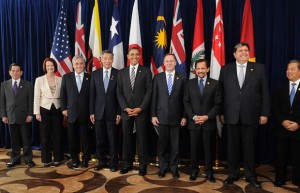
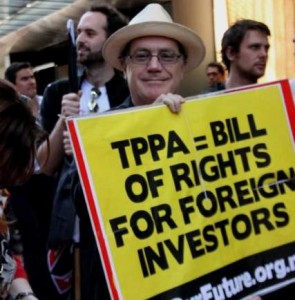
Wikileaks Reveals Quiet Plans and Secret Meetings Behind Trans-Pacific Partnership
Have you heard about the Trans Pacific Partnership? We mentioned it in an update a couple weeks ago. It’s described as an agreement to enhance trade and investments, promote innovation and economic growth among 12 trans-Pacific countries. Those countries include the US, Canada, Japan, Mexico, New Zealand, Australia, Brunei, Chile, Malaysia, Peru, Singapore and Vietnam. As negotiations and talks continue among the countries, much of it is done in secret including an international trade treaty that could have far reaching effects on internet services, copyright law and civil-liberties.
George Kohl:
- It masquerades as a trade deal but its really an economic integration agreement which represents 40 percent of the world’s economy and its a series of countries that circle the Pacific Ocean.
- Its secret negotiations. Unlike most negotiations where you would know what the objectives are of this trade deal. What are the objectives our country is seeking? None of that’s available.
- Congress can’t see what the text is and yet there are 600 corporate lobbyists who get to weigh in and make suggestions.
- It’s a major economic agreement that governs investment. It governs the rights of companies to sue corporations. It governs environmental regulations in our country.
- It governs health and safety regulations here. It will impact food labeling for example.
- We (CWA) were pushing a bill that said if you talk to a call center, you should know where that person works. You should be able to talk to somebody in the United States and that your information should be protected.
- A bill like that could be viewed as interfering with trade and the TPP and the trades that get negotiated would supplant the ability to implement language like that.
- They (TPP) sets up situations that already exist in which companies can sue a country for having environmental protections. Right now there are 14 billion dollars worth of suits where companies are saying my right to gain profit was obstructed by these environmental or other kind of regulations.
- Why is it and who set it up where we open up a trade agreement to Vietnam which pays 20 cents an hour as a minimum wage, which only drive down our wages.
- The objectives that we have in a trade agreement is how do we promote collective bargaining? How do we create growth that benefits working people and that’s not in this picture.
- We’ve got a government that is supposed to be acting of and by the people and instead our government is acting of and by international corporate interests.
- All of this is about creating a structure that lets companies maximize profit but really doesn’t deal with people in their daily lives.
- Where we are at right at this moment is telling Congress that NAFTA didn’t work. There was a promise of 200 thousand jobs, we lost 700 thousand jobs.
- Recently we had a Korea trade deal and promised 70 thousand jobs but we lost 40 thousand jobs.
- People need to reach out to their Congress person now and say be against the Trans-Pacific Partnership.
- You have to ask why is our government acting on behalf of this company (corporations) why isn’t it acting on our behalf?
Guest – George Kohl, Senior Director at the Communications Workers of America.
——
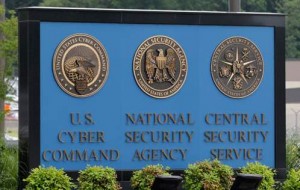
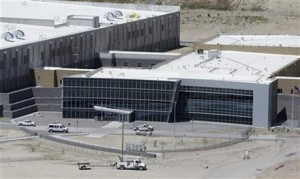
Reform Measures For MetaData Collection, the NSA and EPIC
We take a wide look on recent stories about data mining and privacy, data aggregate corporations, the legal fights to protect personal information and the NSA. Recently a Congressional inquiry revealed how local law enforcement made nearly 10 thousand requests last year for what are called “tower dumps.”
Attorney Alan Butler:
- I think that the core issues that were identified in the letter from the six companies are important issues. Especially the issue of ending bulk surveillance, of increasing transparency of the intelligence process and of improving oversight.
- There are reforms in a number of different areas. We’ve been pushing for transparency of NSA intelligence gathering in the context of criminal investigations for example.
- We’ve been pushing on the intelligence and judiciary committees of Congress and the government to provide public accountability for these programs so people can understand how they function.
- The bulk collection of meta data. . . that program needs to end.
- There’s a bill in Congress right now proposed by Senator Leahy and Rep Sensenbrenner that would end the bulk collection of telephone records if passed today.
- There’s a competing bill introduced by Senator Feinstein and other intelligence committee heads that would enshrine the current bulk collection of telephone records in law.
- Its great to have these companies on board for these reforms but at the same time we’ve been pushing for a number of years for these companies to do more themselves to protect their users.
- Housing this data alone, creates the opportunity for government surveillance in the first place.
- The answer has to be transparency and public oversight of the programs.
- The transparency reports that Google and Apple have published have been impressive documents. They’re putting forward the type of data that they collect on users and the type of data that’s turned over to law enforcement.
- Location data is uniquely sensitive in terms of telephone records because it reveals where a person is, where they go, their associations, their behaviors and can also reveal whether they’re in a private place like a home.
- EPIC is a public advocacy organization and we really seek to inform the public about current and important privacy issues.
- One area of our work is the open government field. We file FOIA requests seeking records on government programs, typically federal agencies. We’re looking at what DHS is doing, what the FBI is doing.
- I worked on a case where we were able to get thousands of records from the FBI on cell phone surveillance technology they use called the Stingray.
- It’s a technology that can be used to intercept cell phones or content.
- I believe that we can build a system where we have oversight mechanisms in place that we can all trust.
- Our organization was founded on strong encryption technology in 1990s where the NSA at the time was trying to establish the “Clipper Chip.”
Guest – Attorney Alan Butler, is the EPIC Appellate Advocacy Counsel. He manages the Appellate Docket at EPIC, including the Amicus Program, and authors briefs in significant privacy, civil liberties, and national security law cases. Recent cases include In re EPIC, United States v. Jones, Clapper v. Amnesty International USA, and Maryland v. King. Mr. Butler focuses on a range of privacy law subjects including the Foreign Intelligence Surveillance Act (FISA), the Electronic Communications Privacy Act (ECPA), location privacy, and other digital Fourth Amendment issues.
————————————————————-
Afghanistan War, CIA Sponsored Terror, Civil Liberties, Criminalizing Dissent, FBI Intrusion, Guantanamo, Habeas Corpus, Human Rights, Political Prisoner, Prison Industry, Supreme Court, Surveillance, Targeting Muslims, Torture, War Resister
Podcast: Play in new window | Download
Updates:
—–
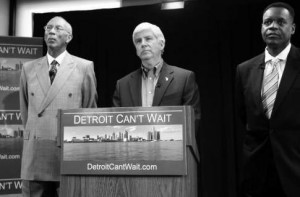
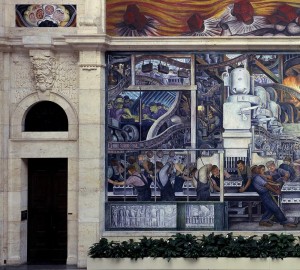
Judge Ruling Allows Detroit Bankruptcy To Move Forward
This summer we spoke with retired auto worker and activist Dianne Feeley about the plans to wipe out the pensions and health benefits of all current and retired city workers by emergency manager of Detroit, Kevyn Orr. We also looked at the history of workers in Detroit from the perspective of black workers and the broader pattern of oppression. Last week, a ruling by Judge Stevens W. Rhodes of the U.S. Bankruptcy Court allows the city of Detroit to move forward in the bankruptcy process. The cradle of the American auto industry will now be allowed to pay off debts and restore essential services.
Professor Laura Bartell:
- It is the first time that a bankruptcy judge that pension obligations constitute contractual obligations that are subject to diminution in bankruptcy.
- Although its rattled pensioners nationwide, its really not that extraordinary.
- The healthcare was never protected by the Michigan Constitution. Everyone has always known that healthcare was subject to modification by the city.
- The cuts in health care are going into effect I believe in February for city employees.
- When we’re talking about the pensions we’re talking about the retirees both the firefighters and policemen unions retirees.
- The city maintains that the plans are underfunded by 3.5 billion dollars.
- The union believes that number is vastly inflated based on projected returns that are too low. Whatever the number is its somewhere between 800 million and 3.5 billion.
- The policemen and firefighters don’t have the benefit of social security.
- You’re not talking about a lot of money going to any individual so if you cut the pension to any particular individual its obviously going to be a major cut for that individual.
- The major problem that Detroit has suffered was a vast decline in population.
- It used to be a much larger city. It’s footprint is still a very large city but the number of people living in that footprint is much smaller than it used to be.
- Among that small population there’s an even smaller number of people actually working and paying taxes.
- So the money coming in to meet the obligations of Detroit has been constantly shrinking.
- Detroit’s obligation to retirees in terms of pensions and healthcare is up at 38 percent and rising constantly. – and in addition we had severe mismanagement of city government including criminality. I’m sure everyone knows our former mayor is now in prison.
- My guess is the pensioners will be hit far less severely than the bond holders. Bond holders are making an investment and taking a risk.
- That’s what bankruptcy is about is all people who have done something to become creditors to the city and they’re not going to get what they deserve.
- That’s the problem, everybody is deserving, everybody should get paid.
- The problem is not that the governor has suddenly taken away the democratic rights of Detroit. We’ve had an emergency manager law for many years in the state of Michigan.
- Detroit is the latest and the biggest to have that happen.
- The next stage is a presentation of a plan of adjustment which he will present to creditors at the end of this month and file with the court at the beginning of January.
Guest – Professor Laura Bartell, after graduating from Harvard Law School, where she was an officer on the Harvard Law Review, she clerked for Judge Alvin B. Rubin of the U.S. Court of Appeals for the 5th Circuit in New Orleans. She then entered practice in New York where she became a partner in Shearman & Sterling, specializing in bank financing and bankruptcy work. She is a member of the American Law Institute and American Bankruptcy Institute and has published articles on bankruptcy topics, federal court-awarded attorneys’ fees and costs, and the attorney/client privilege and work-product doctrine. She teaches Property, Secured Transactions, Bankruptcy and Creditors’ Rights and Effective Oral Communication for Lawyers.
—–
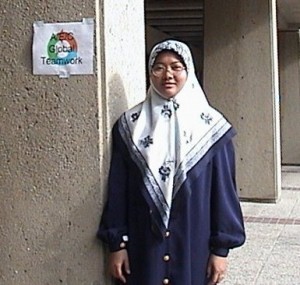
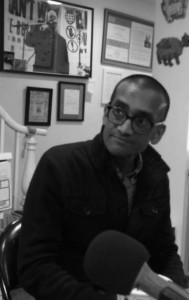
Terrorist Watch Lists and No Fly Lists Cases
How do governments compile lists called no-fly lists of individuals often placed on terrorist watch lists? As we’ve seen, the predictions about individual behavior of Muslims, Communists or Japanese-Americans have often been wildly inaccurate and cause a great deal of harm to these communities. Today to discuss the no-fly list and a recent case proceeding through the courts is returning guest Shane Kadidal senior managing attorney of the Guantánamo Global Justice Initiative at the Center for Constitutional Rights in New York City.
Attorney Shane Kadidal:
- There are broad watch lists and there are lists that people are more familiar with in concept and that’s what being litigated out in California, somebody placed on the no-fly list.
- There are two kinds of no-fly lists, there’s the selectee list where some where on the order of tens of thousands of people are designated for additional security checks when they go through the TSA.
- Then there’s the smaller list which contains several thousand names that sometimes you hear referred to as the no transport list. That’s people who can’t board a flight under any circumstances.
- The US shares its list at times with other countries. We don’t know how much sharing exists.
- The case in California is super interesting because the person who got stopped doesn’t seem like the kind of person that would get stopped except for the fact that she wears a hijab.
- The Terrorism Screening Center is responsible for putting people on the list.
- The interesting thing about this case is that daughter that was put on the list was 14, eight or nine years ago and is now a lawyer in Malaysia and was supposed to testify and was told by Malaysian airlines you are on the no-fly list.
- She’s seeking damages because she couldn’t fly back. This is really the first case to get to trial basically.
- The ACLU has a challenge to which kind of a pure due process challenge case in a case called Lateef v Holder.
- You got put on a list and there’s no real process for challenging those facts.
- If its an accidental match, somebody has the same name as you, or close to you. You can go through this challenge procedure called TRIPP.
- If you win your challenge, they’ll give you a number that you can enter in when you buy your plane ticket.
- CCR along with the Clear Clinic at CUNY Law School filed a case at the beginning of October. The gist of it is that people will end up on the no-fly list and if you complaint about it the FBI will say, if you talk to us you can be taken off the list if you agree to work as an informant on the Muslim community.
- What’s interesting about the couple thousand names (no-fly list) which is much smaller than the number which are on these lists intended to intercept terrorism finance like the list the treasury department maintains like a 500 plus page phone book.
- You can imagine that there might be some logical rationale behind having a short list of people who get a little scrutiny and hope it has more due process than the selectee list has now.
- But the fact that there are some people who are not allowed to fly under any circumstances with any level of search scrutiny that doesn’t seem to make any sense and seems to fit very neatly into our complaint.
- I question if this list can make rational sense.
- Typically if you’re on the no-fly list you get turned away. Typically you don’t get arrested.
- OFAC list, is sort of a list of parties you’re not allowed to do business with. It combines not only sanctions directed at whole countries but also the variety of sanctions directed at terrorism finance.
- This is just like other cases where secrecy is at the core of the defense of the program.
Guest – Shane Kadidal, senior managing attorney of the Guantánamo Global Justice Initiative at the Center for Constitutional Rights in New York City. He is a graduate of the Yale Law School and a former law clerk to Judge Kermit Lipez of the United States Court of Appeals for the First Circuit. In his eight years at the Center, he has worked on a number of significant cases in the wake of 9/11, including the Center’s challenges to the detention of prisoners at Guantánamo Bay (among them torture victim Mohammed al Qahtani and former CIA ghost detainee Majid Khan), which have twice reached the Supreme Court, and several cases arising out of the post-9/11 domestic immigration sweeps. He is also counsel in CCR’s legal challenges to the “material support” statute (decided by the Supreme Court last term), to the low rates of black firefighter hiring in New York City, and to the NSA’s warrantless surveillance program.
——————————————————————————
Afghanistan War, CIA Sponsored Terror, Civil Liberties, Criminalizing Dissent, Habeas Corpus, Human Rights, Political Prisoner, Prison Industry, Supreme Court, Surveillance, Truth to Power, War Resister
Podcast: Play in new window | Download
Updates:
- Jeremy Hammond Sentenced to 10 Years With 3 Additional Years of Supervised Probation
- Jeremy Hammond and Barrett Brown Were Outspoken In Exposing Corporate Collusion With The Government In Conducting Intelligence
- Sarah Kunstler Argument On Behalf Of Jeremy Hammond
—-
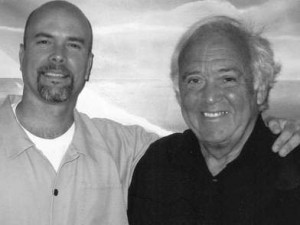
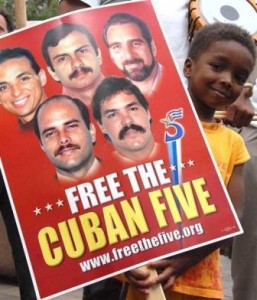
The Cuban Five Case Update: Attorney Martin Garbus
We’re joined today by prominent First Amendment attorney Martin Garbus to get an update on the Cuban Five case. Martin joined the case of the Cuban Five last year and had concentrated his efforts to expose how U.S. government paid journalists in Miami received hundreds of thousands of dollars from the office of Cuba broadcasting to slant the story against the Cuban Five. There’s a lot going on with the case lately such as a habeas corpus appeal, and a NSA / FISA related motion.
Attorney Martin Garbus:
- In 1996, 4 planes from Cuba shot down Brothers to the Rescue planes that’s a right wing group that operates in Miami and has over the years made intrusions to Cuban air space.
- After years of negotiations with the Cuban government and the American government where the American government said they would everything they could to stop these flights.
- Washington intended to do that but by the time it got down to Miami, the orders were ignored.
- So these planes went up in Feb 1996 and were shot down over Cuban air space.
- At the trial the jury concluded that the planes were shot down over international waters. They also concluded that the defendants in this case played some kind of role in the shoot down.
- Both administrations at the time (Bush / Clinton) wanted to be very hard on left wing Cubans or Cuba itself by pressing this prosecution.
- Although the shoot down was 1996, and the government had all the information it needed, it didn’t arrest these defendants until 2 and half years later.
- There was a conviction, at first the appellate court set aside the conviction. Lenny Weinglass argued that brilliantly in that a motion for change of venue should’ve been granted.
- Ultimately, that’s rejected, the Supreme Court denies cert, I get involved in the habaes corpus petition and that’s what we’re talking about now.
- We’re about to file other papers about NSA surveillance which has been revealed recently arising out of Snowden’s revelations.
- What I’m now telling you has not yet appeared anywhere else.
- The defense lawyers in the case, as they prepared the case itself, from the time they were appointed in 1998, to the time of the conviction, and now, Lenny Weinglass leading the defense, – these lawyers traveled back and forth to Cuba.
- We now understand and this applies to you, this applies to anyone who goes to Cuba.
- Anytime you go to Cuba, you’re picked up by NSA surveillance.
- The NSA listening post, the prime one was in Puerto Rico and it was made up largely of US Navy personnel, assigned to the Naval Security Group which is an NSA component.
- When I got back to the United States (from Cuba) they would continue to monitor me. If I were a defense lawyer, my communications with my client would gathered and sent to the FBI and Department of Justice.
- That’s the motion we’re about to file in the next 2 weeks.
- The Solicitor General, on October about 6 weeks ago, admitted there had been surveillance of cases where there had been convictions.
- Our case presents unique problems, Cuba at that time was designated a terrorist state.
- I’ve got the details in the way information was intercepted.
- A large part of the NSA budget last year I think was 52 billion dollars. 25 percent of it is for the CIA.
- What the CIA was doing under the umbrella of the NSA was exactly what the Church Committee said they couldn’t do.
- Journalists that worked for the Miami Herald or CBS, or local Spanish stations . . on the government payroll.
- The stations or newspapers that hired these journalists, didn’t know that they were also getting monies from the government. In 2006, the Miami Herald found out about it.
- One journalist got 286 thousand dollars.
- If you look at the Radio Marti stories, and you look at the Miami Herald stories, you have the same sentences, same paragraphs and its clear its coming out of a central cookie cutter.
- The Radio Marti budget was 15 million dollars a year.
Guest – Attorney Martin Garbus, one of the country’s leading trial lawyers. He has appeared before the United States Supreme Court and the highest state and federal courts in the nation. Time Magazine has named him “legendary . . . one of the best trial lawyers in the country.” He’s also known as the most prominent First Amendment lawyer.
—-
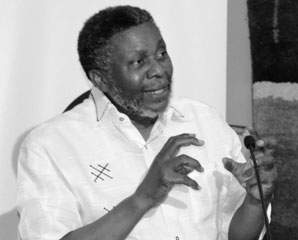
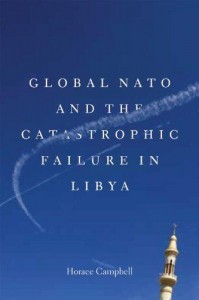
Global NATO and the Catastrophic Failure in Libya: Lessons for Africa in the Forging of African Unity
The course of events that led to NATO’s intervention in Libya is outlined in our guests Horace Campbell’s recently published book Global NATO and the Catastrophic Failure in Libya: Lessons for Africa in the Forging of African Unity. He traces the origin of the Libya conflict in the context of the Arab Spring uprisings and argues how NATO is used by the North American and European capitalist class to impose its political will on the rest of the world. It’s a new model, he explains, of bombing campaigns, militias, terrorist campaigns and private contractors. This NATO campaign caused many civilian deaths and destroyed Libya’s infrastructure. We talk about the broader attacks on the African continent and the investigations into the US embassy killings.
Professor Horace Campbell:
- The revolutionary upheavals that took place in Tunisia and Egypt have had great implication for all societies in this region.
- Libya which has been underdeveloped politically was a place where the western powers manipulated which was supposed to be an insipient uprising in Benghazi, militarized it and turned it into a base for the destabilization for all of North Africa.
- Today as we speak they continue to manipulate what is going on in the Libyan society.
- The book is called Global NATO because the governments of the North Atlantic region, namely the United States and its western European allies to internationalize the basis for military intervention by this NATO.
- NATO was created by this cold war instrument with a mandate to defend western Europe.
- NATO is in alliance with the most conservative countries in the Middle East called the Gulf Cooperation Council.
- We’ve had an attempt by the Wall Street elements to use NATO as an instrument for the United States military management of the international system.
- Why was NATO intervening? To control the resources of Libya, to destabilize North Africa, to stop the African Union project and to create confusion by supporting the same al-Qaeda elements that they’re supposed to be fighting in the “war on terror.”
- These are the reasons why the Left and the peace movement should have opposed the NATO intervention.
- Just like in Syria and Iran, there’s confusion among the Left and progressive forces about what’s going on.
- We need a resolution with responsibility to protect inside of Libya. To protect from the forces of NATO and to protect the Libyan people from the militias that have been unleashed by al-Qaeda, supported by the CIA and NATO.
- President Obama exercised intense pressure on the South African presidents and other presidents. I think he telephoned directly for them to vote for this resolution.
- The matter of Libya is not over.
- The same NATO that created the problem in Libya, the same United States, France and Britain is now seeking the support of Congress to go into Libya, into the same place that they created the problem.
- The U.S. designs on the continent of Africa is quite confused at the moment. It’s confused because of the assertiveness of the African Union and the African people.
- It turns out as we’ve seen in Libya, that it is the United States and the western forces that are supporting jihadists who are called terrorists. We’ve seen in a place like Somalia where the African people themselves through the African Union have been able to bring some stability to Somalia.
- There’s no military body that monitors the work of private military contractors.
- Now the peace movement should be calling for a reduction in the military budget.
- In the case of Libya, General Petraeus was using Benghazi as a base to recruit conservative Islamic fundamentalists from Libya to go to Syria to fight.
- Here’s a web of conspiracy of military, of Israel, Saudi Arabia and the CIA fomenting instability all across North Africa and the Middle East.
- There was no consulate in Benghazi, this was a CIA facility that was being used to support al-Qaeda elements.
- We have a situation in Libya where the country is in complete disarray. There’s no law, there’s no order. The people of Tripoli demonstrated two weeks ago against these militias and 40 people were killed.
Guest – Professor Horace Campbell is Professor of African American Studies and Political Science at Syracuse University. His recent book is Global NATO and the Catastrophic Failure in Libya. He is author of: Rasta and Resistance From Marcus Garvey to Walter Rodney; Reclaiming Zimbabwe: The Exhaustion of the Patriarchal Model of Liberation; Pan Africanism, Pan Africanists and African Liberation in the 21st Century; and Barack Obama and 21st Century Politics.
——————————————————————
CIA Sponsored Terror, Civil Liberties, Criminalizing Dissent, FBI Intrusion, Habeas Corpus, Human Rights, Political Prisoner, Surveillance, Truth to Power, War Resister
Podcast: Play in new window | Download
Updates:
- Socialist Wins Seat on Seattle City Council
—–
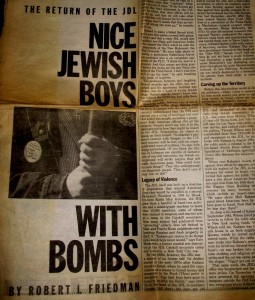
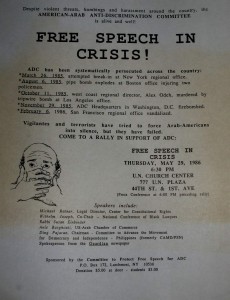
Alex Odeh Case – Abdeen Jabara
On October 11, 1985, prominent Palestinian-American leader Alex Odeh was killed by a pipe bomb at the offices of the American-Arab Anti-Discrimination Committee, where he worked as the group’s western regional director in Santa Ana, California. Now, the FBI and Justice Department are being urged to renew its investigation into this shocking political murder. history.
Very quickly, the FBI named the militant Jewish Defense League, or JDL, as a focus of its investigations. Yet, more than two decades later, no one has been questioned or indicted for Odeh’s murder. Today we welcome back civil rights attorney Abdeen Jabara who helped found the American-Arab Anti-Discrimination Committee. He joins us to talk more about the reopening of this political murder investigation 28 years later.
Attorney Abdeen Jabara:
- The FBI says the case has not been closed and its an ongoing investigation.
- We’re talking about 28 years after the fact.
- Congresswoman Sanchez from Orange County, California from the 46th district wrote a letter to Eric Holder and to the FBI requesting some closure on this case and she got back a very unsatisfactory reply.
- She has joined with several other Congress people, John Conyers of Michigan and others to ask for hearings in the Judiciary Committee of the House on this case.
- There have been many ups and downs in the case since Alex was killed.
- Several people have been arrested in the case but not for the assassination of Alex Odeh.
- The JDL was created in 1968 by Meir Kahane.
- Chairman of our organization, Jim Abarez was contacted by the FBI and was told that he, myself and two other individuals were placed on a hit list by the Jewish Defense Organization.
- Prior to the killing of Alex Odeh, there were a number of incidences. We had our regional office in Boston burned. We had attacks here at our office in New York City. A number of telegrams, threatening calls, all types of harassment was occurring on a daily basis and then Alex Odeh was killed.
- He left 3 beautiful daughters and a widow in Orange County and they are active to this day and his brother is active in trying to maintain the pressure to keep this case alive and bring justice about.
- The Israeli government has not been cooperative with this FBI investigation.
- The fact of the matter is that Arab-Americans have little or no political power in this country.
- I think there is a possibility of movement and we need to have people contact Eric Holder’s office. The FBI is part of the Justice Department, the FBI is responsible for investigating these cases.
Guest – Attorney Abdeen Jabara, co-founder of the American-Arab Anti-Discrimination Committee.
——
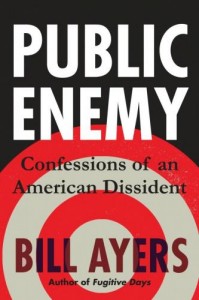
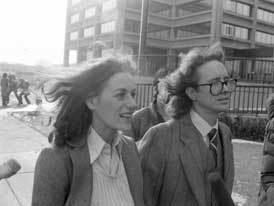
Public Enemy: Confessions Of An American Dissident
A sequel to Fugitive Days, Public Enemy: Confessions of An American Dissident chronicles Bill Ayers life after the Weather Underground. Since his memoir Fugtive Days was published September 10, 2001 about his life in Students for a Democratic Society and later the Weather Underground, Ayers was under attack by right wing media which tied him to the catastrophes of 9/11 based on a New York Times interview quote. Bill Ayers became famous in the early 1970s as a leader of the Weather Underground; he is known to have participated in the bombings of New York City Police Department headquarters in 1970, the US Capitol building in 1971, and the Pentagon in 1972. He surfaced in the mid-1970s, when the government charges against him were dismissed for prosecutorial misconduct.
His new book Public Enemy starts during the 2008 presidential debate in which his neighbor Barack Obama in the Hyde Park community of Chicago was confronted about their association. The book also describes how Ayers and his wife Bernadine Dohrn rebuilt their lives as public figures. Ayers became a professor of education at the Chicago campus of the University of Illinois.
Bill Ayers:
- The American dissident part came pretty naturally. I grew up in the heat of the civil rights movement.
- I came of age when the world was on fire.
- In our own country it was the black freedom movement finding the moral agenda for the whole nation and I found myself drawn inexorably into it.
- The public enemy part comes from continuing to live a long life as a radical, and as a public radical and not being willing to trim my sails or my revolutionary hope stream spirit.
- Come the 2008 election, the national election. I was thrown unwittingly, unwillingly into that national campaign.
- The narrative that Barack Obama palled around with terrorists, that Barack Obama had a shady Palestinian friend or the narrative that he hung around with a black nationalist preacher, that narrative was spun by Hilliary Clinton long before Palin and McCain picked it up.
- The ole American favorite past time, guilt by association, that’s how I became a public enemy.
- I was a kid coming out of a privileged background. I went to the University of Michigan and I couldn’t sleep for about 2 years because the world was on fire.
- I was arrested opposing the war in Vietnam. I spent ten days in county jail and there I met a man whose wife just founded a freedom school.
- I marched out of jail into my first teaching job. For me teaching was always linked deeply with the quest for social justice. I returned to teaching in 1978, after our first child was born.
- The ideal is that every human being is of incalculable value in a country that found on the idea that we are all equal.
- What we ought to be demanding is an educational system that creates free people, people with minds of their own, people who are able to interrogate the world before them.
- In Nazi, Germany, they had wonderful schools that taught amazing literature and music, arts and so on, and they also had a system based on obedience and conformity and doing what you’re told and following the rules. That’s a recipe for catastrophe in any free society.
- What I’ve spent most of my adult life doing is fighting for an educational system where the fullest development of each becomes the condition for the full development of all and the fullest development of all becomes the condition for the full development of each.
- Who are you? How did you get here? Why are you in the freedom movement? What are you trying to accomplish and where do you want to go? The message of those questions are revolutionary.
- The Highlander Folk School
- We don’t have a king that can save us. We are sovereign.
- Those of us who still think of ourselves as revolutionaries living in difficult times, dark times, have to find ways to become movement builders. Movement building is on the agenda. Bringing those together who are working in various fields to change the frame of the discussion.
Guest – William Ayers, Distinguished Professor of Education and Senior Bill Ayers University Scholar at the University of Illinois at Chicago (retired), member of the executive committee of the Faculty Senate and founder of both the Small Schools Workshop and the Center for Youth and Society, taught courses in interpretive and qualitative research, oral history, creative non-fiction, urban school change, and teaching and the modern predicament. A graduate of the University of Michigan, the Bank Street College of Education, Bennington College, and Teachers College, Columbia University, Ayers has written extensively about social justice, democracy and education, the cultural contexts of schooling, and teaching as an essentially intellectual, ethical, and political enterprise.
——————————————————————–
CIA Sponsored Terror, Civil Liberties, Criminalizing Dissent, Human Rights, RFID
Podcast: Play in new window | Download
Updates:
——

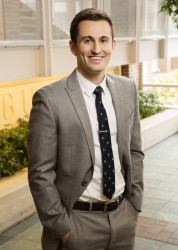
Local Police Departments and Mass Surveillance Technology
As technology becomes more available to local police departments, mass surveillance, data collection and retention are now rapidly expanding. There are third parties involved profiting from collecting data and selling it back to various agencies and governments down the line. There are many concerns including the reasonable expectation of privacy in public and the build up of individual digital dossiers. We’re joined today by Assistant Professor Law Stephen Rushin at the University of Illinois College of Law. In his recently published paper The Legislative Response to Mass Police Surveillance, Rushin discusses the rise of expanding advanced police surveillance and public privacy.
Attorney Stephen Rushin:
- Traditionally law enforcement have utilized a bunch of different technological replacements for traditional behavior.
- Law enforcement in the past might have tried to say, isolate individuals that were speeding. Before the advent of radar, the ability to measure this in a technological way, they had ways of simply following people.
- So, once law enforcement had the ability to monitor speed electronically, that was a means of dramatically improving the efficiency on an otherwise lawful police activity.
- Initially these technological innovations seem to be a relative good thing but in recent years there’s been a movement in local law enforcement to utilize extreme data retention with things like Automatic License Plate Readers, security cameras with facial recognition.
- These tools allow law enforcement to monitor an entire community in a relatively invasive way without invading any legally protected areas of privacy.
- Local law enforcement is trying to share this data across jurisdictional lines.
- We have 18 thousand different local police departments.
- Once that data gets shared, its essentially out in the open.
- These private automatic license plate readers are put up all across the country to monitor the whereabouts of cars.
- Whenever someone is driving in public, you don’t expectation of privacy in your movements.
- What’s interesting is these private third parties are working with law enforcement and sharing that data.
- We are actually just starting to learn the dangers of big data collection by the state.
- If I collect years of data from automatic license plate readers, I’d have a pretty good digital dossier of where one individual person has been over the last two years.
- I know stuff about where that person goes during the day. I know about potentially their political affiliation.
- If you allow local law enforcement to collect copious amounts of data on an individuals’ whereabouts, then you potentially allow them to know a lot about their citizens.
- We need to distinguish between observational comparison and what I call indiscriminate data collection.
- The proposal I make is that we need to be concerned about the length of time local law enforcement retain data.
- The ACLU is doing terrific work, surveying police departments to see what kind of data they’re collecting via surveillance.
- There’s a lot of questions about how ALPR work has effected minority groups especially Muslims in the UK.
- Evidence has emerged that authorities used ALPR to surveil Muslims in the UK.
- Social Science Research Center
Guest – Attorney Stephen Rushin, research focuses on criminal law, criminal procedure, and policing. His ongoing research uses a combination of qualitative and quantitative methods to examine the Justice Department’s implementation of structural reform litigation in American police departments. He has previously published articles on advanced surveillance technologies, police interrogation procedures, juvenile justice policy, and federal sentencing laws. Rushin holds a J.D. from Berkeley Law, where he served on the law review. He received a B.A. in government from the University of Texas, where he graduated with high honors. Rushin is currently a Ph.D. candidate in the Jurisprudence and Social Policy Program at Berkeley.
—–
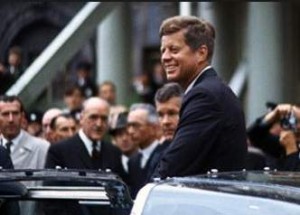
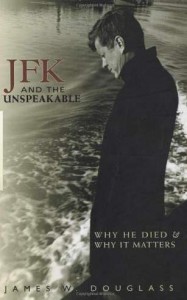
JFK and the Unspeakable: Why He Died and Why It Matters by Jim Douglass
JFK and the Unspeakable is the first book of 3 on the assassinations of the 1960s. Orbis Books has commissioned author James W. Douglass to write about the murders of JFK, Malcolm X and Martin Luther King, and his the third will be on the assassination of Bobby Kennedy. The heart of JFK the Unthinkable, is not how Kennedy was killed or how Kennedy became a threat to the systemic war machine, but why DID Kennedy die? Author James Douglass says Kennedy knew that he would die and had the guts to stand up to the system and take the hit. This narrative was lost for decades, obscured by disinformation about Kennedy’s character and the conspiracy of his assassination. One review summarizes Douglass’s book in this way : JFK’s belated effort to turn America from an armed culture of victory to a member of an international peaceful world was shot down in Texas for a reason.
Jim Douglass:
- John F. Kennedy’s experience in WWII: He was in the South Pacific, he volunteered. He was on that PT boat.
- What happened on that PT boat, is that it got split into two by a Japanese destroyer. He lost brothers and friends at that time. An extraordinary experience being adrift on the ocean warning other PT boats. The experience create a distrust in military authority.
- He said that he wanted to splinter the CIA into a thousand pieces and scatter to the winds.
- As Kennedy said to his friends, “they figured me all wrong.”
- The Unspeakable: the kind of evil and deceit that seems to go beyond the capacity of words to describe. The midst of war and nuclear arms race, the assassinations of Kennedy, Martin Luther King and Malcom X that the term was used.
- JFK’s vision is articulated in the address June 10, 1963, arising from the turnaround of the missile crisis and Bay of Pigs. He wanted to move step by step into a disarmed world.
- Nikita Khrushchev put that speech all over the Soviet Union. The Cuban Missile Crisis is a deeply misunderstood part of our history, because it’s usually portrayed as Kennedy going to war with Nikita Khrushchev and beating him.
- The truth was that Kennedy and Nikita Khrushchev were in over their heads, the US generals wanted nuclear war, because they had more warheads than the Soviets.
- Nikita Khrushchev: We now have a common enemy from those pushing us toward war.
- At that point the Cold War turned upside down because Kennedy and Khrushchev became closer to each other than either was toward their own military power system.
- Vietnam: Kennedy’s military people would not give him an exit policy. He signed the withdrawal order from Vietnam before he was assassinated.
- His friends said that he had an obsession with death. It was not an obsession but a real assessment that he was going to die. If you try to turn around a national security state that is dominating the world,
- and you do so as president of the United States, of course you’re going to die. Kennedy knew that.
- The book is a story on the deliberate destruction of hope, the vision of change, a turning of this country all of which was happening and had to be stopped. US Agencies killed Dr. Martin Luther King – 1999 Verdict
- We’re in the same scene right now with Petraeus and McChrystal setting up Obama. They were dictating terms to Obama, unlike Kennedy, he did not face them down.
- We need to get out ahead of Obama so that he can do something.
Guest – James W. Douglass, author and a longtime peace activist and writer. James and his wife Shelley are co-founders of the Ground Zero Center for Nonviolent Action in Poulsbo, Washington, and Mary’s House, a Catholic Worker house of hospitality in Birmingham, Alabama.
————————————————————————-
CIA Sponsored Terror, Civil Liberties, Habeas Corpus, Human Rights, Political Prisoner, Prison Industry, Supreme Court, Surveillance, Targeting Muslims
Podcast: Play in new window | Download
Updates:
—-
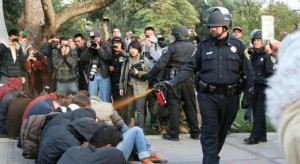
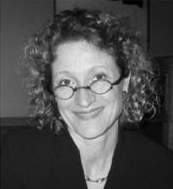
Lawyers You’ll Like: Attorney Brigitt Keller
On our Lawyers You’ll Like series we’re joined today by Attorney Brigitt Keller. She’s the Executive Director of the National Police Accountability Project (NPAP). Brigitt holds a law degree from Fribourg University Law School in her native Switzerland and an LLM in American Law from Boston University. She is admitted to practice law in New York. Prior to attending law school, Brigitt counseled victims of domestic violence and was instrumental in founding the Swiss National Council of Women’s Shelters. In addition to her engagement for NPAP, Brigitt is a fellow at the International Center for Conciliation and occasionally teaches conflict resolution workshops.
Attorney Brigitt Keller:
- NPAP’s mission is to hold law enforcement officers including prison personnel accountable for civil rights violations and police misconduct and brutality.
- As an organization we provide training and support for civil rights attorneys, legal workers and community activists.
- We also work with other organizations with similar efforts to change policy and practices and provide relevant information to the public.
- We see increasing disproportionate measures taken by police.
- The police (NYPD) no longer stop people when there is suspicious activity. They preventively sweep up hundreds of thousands of young men of color.
- When tasers were initially brought on the market, they were really sold to the public with the argument that they would be used instead of firearms.
- What we observe today and this counts for all over the country is that tasers are used in cases where there would never ever be a justification for the use of a firearm.
- When you think about why should we have police, its really to protect the people of this country,
- Young people of color have a very good sense of when policing is legitimate and when its not legitimate.
- These strategies make the community very unsafe. People will not call the police if the police behaves like an occupying army.
- I find the involvement of community activists and families of victims incredibly important.
- There is a different awareness today about police misconduct.
- I want to make clear that damage has been done already – that the fact that the judge was recused from the case with in my opinion, no valid reason. Secondly, the police are allowed to violate the rights of New Yorkers until the stay will be lifted.
- My interest in the law started initially by working for 7 years in a shelter for domestic violence victims.
- Police violence is something truly international. Even in a country like Switzerland where crime numbers are pretty low, there is police violence.
- I find it important that there is no abuse of power and police violence is abuse of power.
- www.nlg-npap.org
Guest – Attorney Brigett Keller – Executive Director of the National Police Accountability Project (NPAP). Brigitt holds a law degree from Fribourg University Law School in her native Switzerland and an LLM in American Law from Boston University. She is admitted to practice law in New York. Prior to attending law school, Brigitt counseled victims of domestic violence and was instrumental in founding the Swiss National Council of Women’s Shelters. In addition to her engagement for NPAP, Brigitt is a fellow at the International Center for Conciliation and occasionally teaches conflict resolution workshops.
—–

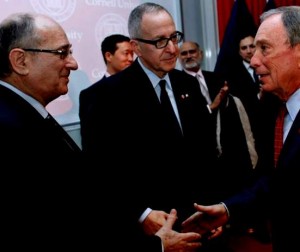
A Panel Discussion: Militarizing, Domestic Spying, and the Boycott of Israel
We hear a presentation by Anna Calcutt (New Yorkers Against the Cornell-Technion Partnership – NYACT), NYC-based BDS activist, will supply background on the conception and planning of the Cornell-Technion campus in NYC, along with reasons to oppose The Technion–including its deep-rooted ties with the Israeli weapons industry and military, the growth of the anti-Technion campaign, and what needs to be done next.
Recorded by Deep Dish TV
—————————————————————————————————-

























